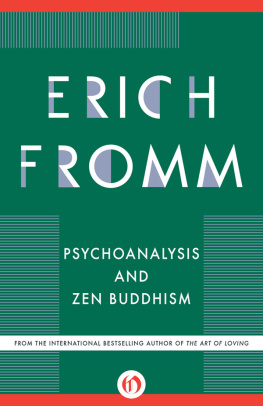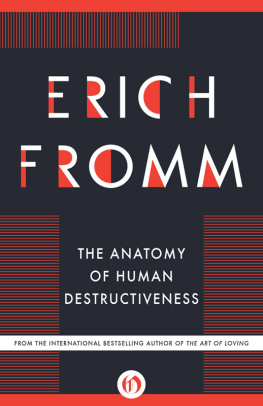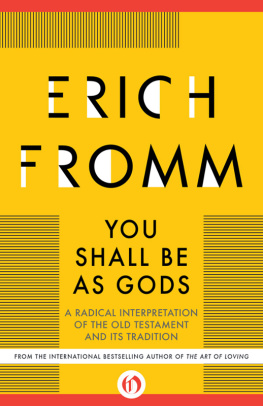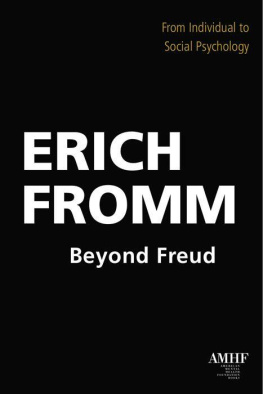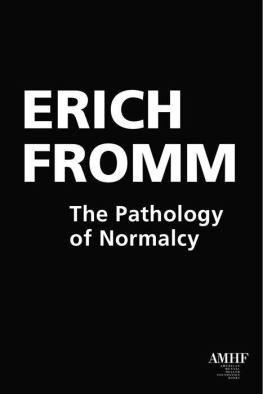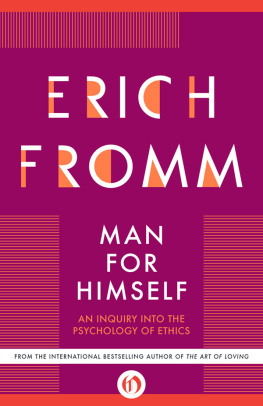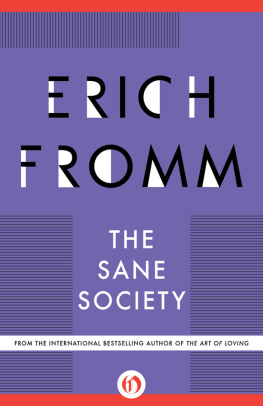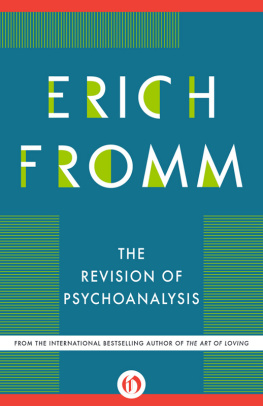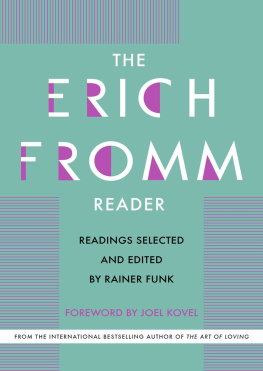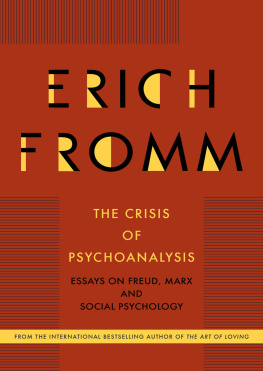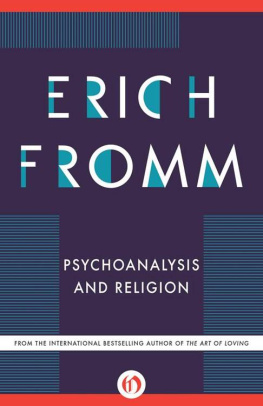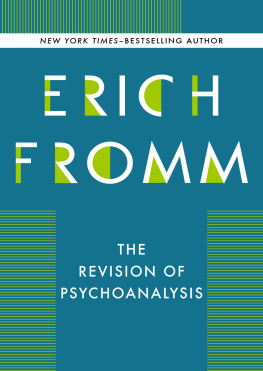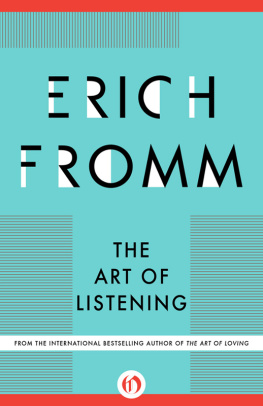
Psychoanalysis and Zen Buddhism
Erich Fromm

FOREWORD
This book has its origin in a workshop with Daisetz T. Suzuki on Zen Buddhism and Psychoanalysis, which was held under the auspices of the Department of Psychoanalysis of the Medical School, Autonomous National University of Mexico, during the first week of August, 1957, in Cuernavaca, Mexico.
The conference was attended by about fifty psychiatrists and psychologists from both Mexico and the United States (the majority of them psychoanalysts). Aside from my own paper published here, a number of other papers were given and discussed:
Dr. M. Green, The Roots of Sullivans Concept of Self.
Dr. J. Kirsch, The Role of the Analyst in Jungs Psychotherapy.
Dr. R. De Martino, The Human Situation and Zen Buddhism.
Dr. I. Progoff, The Psychological Dynamism of Zen. and The Concept of Neurosis and Cure in Jung.
Miss C. Selver, Sensory Awareness and Body Functioning.
Dr. A. Stunkard, Motivation for Treatment.
Dr. D. T. Suzuki: Lectures on Zen Buddhism.
Dr. E. Tauber, Sullivans Concept of Cure.
Dr. P. Weisz, The Contribution of Georg W. Groddeck.
Any psychologist, even twenty years ago, would have been greatly surprisedor shockedto find his colleagues interested in a mystical religious system such as Zen Buddhism. He would have been even more surprised to find that most of the people present were not just interested but deeply concerned, and that they discovered that the week spent with Dr. Suzuki and his ideas had a most stimulating and refreshing influence on them, to say the least.
The reason for this change lies in factors which are discussed in my paper. To sum them up briefly, they are to be found in the development of psychoanalytic theory, in the changes that have occurred in the intellectual and spiritual climate of the Western world, and in the work of Dr. Suzuki, who, by his books, his lectures, and his personality, has made the Western world acquainted with Zen Buddhism.
Every participant in the conference was expected to have some acquaintance with Dr. Suzukis writings, just as many a reader of this volume may have. My own paper has been completely revised for publication, both in length and in content. The main reason for this revision lies in the conference itself. While I was acquainted with the literature on Zen Buddhism, the stimulation of the conference and subsequent thinking led me to a considerable enlargement and revision of my ideas. This refers not only to my understanding of Zen, but also to certain psychoanalytic concepts, such as the problems of what constitutes the unconscious, of the transformation of the unconscious into consciousness, and of the goal of psychoanalytic therapy.
In relating Zen Buddhism to psychoanalysis, one discusses two systems, both dealing with a theory concerned with the nature of man and with a practice leading to his well-being. Each is a characteristic expression of Eastern and Western thought, respectively. Zen Buddhism is a blending of Indian rationality and abstraction with Chinese concreteness and realism. Psychoanalysis is as exquisitely Western as Zen is Eastern; it is the child of Western humanism and rationalism, and of the nineteenth-century romantic search for the dark forces which elude rationalism. Much further back, Greek wisdom and Hebrew ethics are the spiritual godfathers of this scientific-therapeutic approach to man.
But in spite of the fact that both psychoanalysis and Zen deal with the nature of man and with a practice leading to his transformation, the differences seem to outweigh these similarities. Psychoanalysis is a scientific method, nonreligious to its core. Zen is a theory and technique to achieve enlightenment, an experience which in the West would be called religious or mystical. Psychoanalysis is a therapy for mental illness; Zen a way to spiritual salvation. Can the discussion of the relationship between psychoanalysis and Zen Buddhism result in anything but the statement that there exists no relationship except that of radical and unbridgeable difference?
Yet there is an unmistakable and increasing interest in Zen Buddhism among psychoanalysts. What are the sources of this interest? What is its meaning? To give an answer to these questions is what this book attempts to do. It does not try to give a systematic presentation of Zen Buddhist thought, a task which would transcend my knowledge and experience; nor does it try to give a full presentation of psychoanalysis, which would go beyond the scope of this book. Nevertheless, I shallin the first part of this bookpresent in some detail those aspects of psychoanalysis which are of immediate relevance to the relation between psychoanalysis and Zen Buddhism and which, at the same time, represent basic concepts of that continuation of Freudian analysis which I sometimes have called humanistic psychoanalysis. I hope in this way to show why the study of Zen Buddhism has been of vital significance to me and, as I believeis significant for all students of psychoanalysis.
I. TODAYS SPIRITUAL CRISIS AND THE ROLE OF PSYCHOANALYSIS
As a first approach to our topic, we must consider the spiritual crisis which Western man is undergoing in this crucial historical epoch, and the function of psychoanalysis in this crisis.
While the majority of people living in the West do not consciously feel as if they were living through a crisis of Western culture (probably never have the majority of people in a radically critical situation been aware of the crisis), there is agreement, at least among a number of critical observers, as to the existence and the nature of this crisis. It is the crisis which has been described as malaise, ennui, mal du sicle, the deadening of life, the automatization of man, his alienation Man has followed rationalism to the point where rationalism has transformed itself into utter irrationality. Since Descartes, man has increasingly split thought from affect; thought alone is considered rationalaffect, by its very nature, irrational; the person, I, has been split off into an intellect, which constitutes my self, and which is to control me as it is to control nature. Control by the intellect over nature, and the production of more and more things, became the paramount aims of life. In this process man has transformed himself into a thing, life has become subordinated to property, to be is dominated by to have. Where the roots of Western culture, both Greek and Hebrew, considered the aim of life the perfection of man, modern man is concerned with the perfection of things, and the knowledge of how to make them. Western man is in a state of schizoid inability to experience affect, hence he is anxious, depressed, and desperate. He still pays lip service to the aims of happiness, individualism, initiativebut actually he has no aim. Ask him what he is living for, what is the aim of all his strivingsand he will be embarrassed. Some may say they live for the family, others, to have fun, still others, to make money, but in reality nobody knows what he is living for; he has no goal, except the wish to escape insecurity and aloneness.
It is true, church membership today is higher than ever before, books on religion become best sellers, and more people speak of God than ever before. Yet this kind of religious profession only covers up a profoundly materialistic and irreligious attitude, and is to be understood as an ideological reactioncaused by insecurity and conformismto the trend of the nineteenth century, which Nietzsche characterized by his famous God is dead. As a truly religious attitude, it has no reality.
Next page
